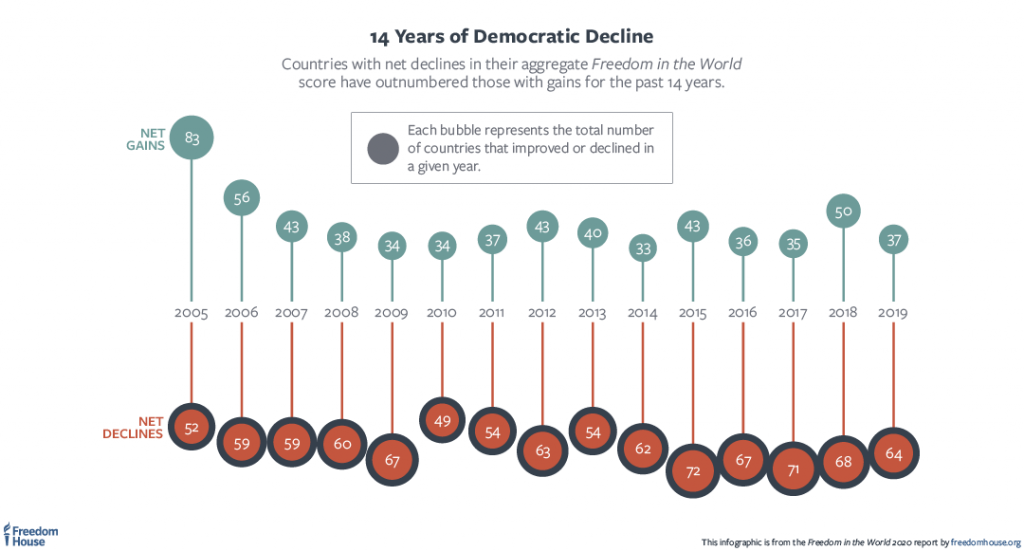
Democracy has been around since ancient Greek civilization, where it first appeared in Athens during the classical antiquity period. The main idea of democracy was to involve all members of state in the process of governing the society. Nowadays, elective representatives are more common in democratic societies, as countries are so huge that it is simply not possible to involve the public in all levels of decision-making.
Democracy is one of the best and most practiced systems in the world, simply because of its freedom and the human rights it gives to human life. It is also the most practiced governing system in the most developed nations in the world. A short video below gives further explanation about democracy and how it works.
To have an effective democracy, there are seven pillars of democracy that need to be kept in check.
- Legitimacy: recognition of officials that are given power to govern by people.
- Separation of powers: separation of legislative, judicial and executive branch.
- Popular participation: use of opinion polls and debate to steer decision-making.
- Checks and balances: system of check and balances between the branches of government.
- Periodic elections: mechanism to ensure periodic and fair elections.
- Rule of law: supremacy of law above all public, civil and government institutions.
- Fundamental Human Rights: free given rights includes the right to life, right to freedom of speech, right to freedom of expression, freedom of movement etc.
If these pillars of democracy are kept in check, democracy can do wonders for the well-being of mankind and our environment. However, if any pillar of this system is neglected it can have destructive consequences for unity, peace, and trust in society. One example of neglecting the pillar of fair elections is in Malta, where the current government has announced a free money scheme for public to conjure support of upcoming election in 2022. Such actions put democracy at risk of becoming a failed democracy, resulting in a deranged governing system. Another example of neglecting one of the pillars of democracy is in the UK, where Boris Johnson, the current British prime minister, refuses to step down despite having illegal parties in the prime minister residence during the pandemic. The British prime minister has neglected the rule of law pillar of democracy as most of the UK was under strict lockdown whereas he was having parties in his official government residence.
Democratic decline over the years
Democracy has been a target of various political ideologies for some time now. From the era of Cold War, where democratic values and communism were the ideologies that divided the world and eventually democracy won because of strong values and freedom it gave to public. However, over the years the spark of democracy has been dimming and resulting in a leaderless society that faces huge challenges from other players in the global system. One of these players are the big four technology companies which thrived solely because of democratic system, however, the power they have accumulated over the years has not been beneficial for democracy.

The infographic above from a report by Freedomhouse.org, which explores the declining state of democracy around the world. The report mentions how the nationalism epidemic is gripping big democratic players such as, India, the world’s largest democracy, has turned towards Hindu nationalism undermining the freedom of minorities. India has also relied on Big Four tech giants to perform digital surveillance in its citizens. For e.g, a publication from German GIGA institute mentions how Facebook “transparency report” reports that India was second only to the US in requesting the company to provide users’ data.
The freedom house reports mention how the long steady beacon of democratic values, the USA, has fallen behind to its fellow traditional democratic peers. USA is now closer to Argentina, Panama, Poland in terms of aggregate freedom score, than to Italy, Latvia, and Mauritius. Such statistics are an alarming situation for the democratic system around the world, whereas the countries that aim towards totalitarian governing systems are on the rise. One example is how the Communist party of China has made tremendous strides in development of technology and wealth to counter democratic influence around the world. The influence of such totalitarian regimes have reached to such heights that even big four tech giants cannot afford to take bold steps against them, whereas, big four tech giants are easily able to circumvent laws of democratic countries to favor them. One such example is that how Apple lobby group was able to interfere in Canadian politics to defeat the right to repair law only to collaborate with Best Buy a month later for exclusive repair service. Whereas the same company, Apple, has taken steps in different direction. In China, Apple and the Chinese government have come to an agreement to cede legal ownership of its customers’ data to Guizhou-Cloud Big Data, or GCBD, a company owned by the government of Guizhou Province, whose capital is Guiyang. Such examples only show how democracy has become ineffective in dealing with big four tech giant companies, moreover, these companies are able to exploit and take away democratic freedom from public living in democratic countries.
Rise of Big four technology giants
The rise of Apple, Google, Amazon, and Facebook has no precedence in human history except for chartered companies. These companies control tremendous amounts of wealth, market share, and resources that has even overtaken some countries. To give an example of the wealth they possess, on 3 February 2022, Facebook stock fell by 26% which was equal to a whopping $232 billion market value wiped off from the stock market. The wiped out market value of $232 billion is more than 146 countries GDP out of 190 countries in the world. It is safe to say that these companies are bigger than most countries in the world. The big four companies in total are worth $5 trillion as of 2020. The earnings of these big four companies are so bonkers that the earnings per minute for these companies top $200,000 at least for 2021.
- Amazon: $837,330.25 per minute
- Apple: $691,234.57 per minute
- Google: $426,805.56 per minute
- Facebook: $201,936.73 per minute
With such resources, these companies also have a sphere of influence from Washington to Brussels and can influence policies to be favourable for them. The political influence these companies can exert and even put regulators under pressure is discussed in Political Influence section below.
Accumulation of wealth
One of the tools we can use to influence politics is money. Coincidentally, this is just what the big four tech companies have a lot of. Most would describe the manner in which these companies have accumulated this wealth as unfair, or even unethical. By moving profits through various tax havens, the capital gains tax the companies pay is not only much lower, but also paid in different countries than the profit was initially made in. This is damaging to the country where the money was made, while also allowing the company to accumulate more wealth than they should. To illustrate the size of the problem, Apple used to have over $100 billion in offshore accounts, avoiding paying billions in taxes. It is easy to see that if the damage done by a single company is in the billions, the total damage can easily be orders or magnitude higher.
Political influence
All this accumulated wealth gives companies various ways to (maybe unintentionally) hurt democracy. One way in which companies are able to influence politics is as old as politics itself, lobbying. We will ignore whether this should be legal for now (but it shouldn’t). The tech industry alone has spent $436 million, just in the United States. It should come as no surprise that Facebook and Amazon, both companies that are often featured negatively in the news, are the companies who spend the most (~$20 million each). It’s not just the United States that suffer from lobbying. Ever since the European policymakers hardened their stance against tech companies, spending on lobbying has increased. Even though lobbying is undesirable, if done transparently, voters can at the very least know who received money from these companies before voting. Unfortunately, companies prefer to keep the details of their lobbying a secret, despite this being a violation of the European Union’s guidelines.
But it gets worse than that. Tech companies collect unfathomable amounts of data. The initial goal of this data collection was fairly harmless. For instance, to allow the bookstore around the corner to advertise a new book to potential buyers. However, once such companies know enough about people, it is easy for them to influence people’s behavior. From trivial things, such as fashion, or the next TV-show to watch, to deciding election results. The latter sounds far-fetched, but it has already happened. And many times. The British company Cambridge Analytica has, in conjunction with Facebook, not just influenced, but decided various elections around the globe. The data collected by Facebook allowed Cambridge Analytica to target specifically those people who were not only susceptible to manipulation, but also easy to reach on Facebook’s platforms. And considering Facebook’s large user base, there was no lack of people to target. One example of Cambridge Analytica’s meddling is the 2016 presidential election. They claimed the only reason Trump won, was because of them influencing just the right people to win the vote.
So what’s next?
The fact that these companies are able to earn large amounts of money, while paying little to none in taxes in unacceptable. Preventing companies from making a profit in a given country without paying taxes in said country by moving the money to tax-havens should be a priority. To do this, loopholes have to be closed. But this is not something we can do once, and be done with it. Companies will find new loopholes, and we have to keep reacting.
We are now left with the question of how we can restrict these companies’ influence over our democracy. One might naively think a few laws will do the trick. While this is a good start, it is not the entire solution. These large companies, with an army of lawyers, can try to find ways to circumvent these laws without breaking them. Or if that is too expensive, they could blatantly break the laws and pay the fine, since the fine is often lower than the additional profit. That sounds ridiculous, but it happens.
If laws alone are not enough, then what do we have to do? As with any laws, if there is no, or lacking, enforcement, it might as well not exist at all. Right, so now we have laws, and enforcement. Still not enough! As mentioned earlier, if the potential fines are lower than the profits, companies have no incentive to follow the laws. This means we need fines that cover the profits made by breaking the law. Unfortunately, this is, again, no trivial task. We can not set a fixed fine for breaking a given law. Fines high enough to cover the illegal profits of large tech companies would instantly bankrupt smaller companies. Therefore, we need to set the height of the fine for each individual case.
While these measures are a good place to start, they will do nothing if just a handful of countries implement them. Only once many countries (e.g., the European Union and North America) implement these measures, without skipping any of them, we may see positive results. As of now, the European Union is working as a whole, implementing rules and regulations to limit the scope of tech companies’ influence. And going even further, they are enforcing said rules, fining companies that are in violation of the law hefty amounts. Both Google and Facebook have already received $5 billion fines. This is a good start, but there is plenty of work to be done.

